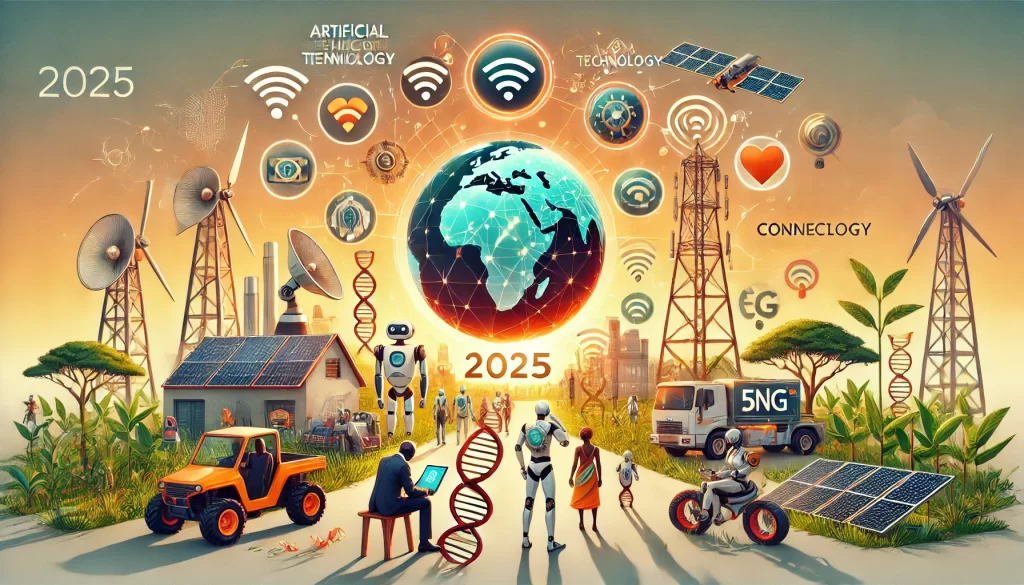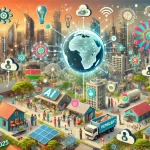Technology is advancing at an unprecedented pace, bringing forth innovations that are reshaping our world. From artificial intelligence (AI) to augmented reality (AR), these advancements are not only transforming industries but also significantly impacting how we live, work, and interact. This article explores the latest updates in technology and delves into their profound effects on users across various domains, with a focus on Kenya’s growing tech landscape.
Key Technological Updates
- Artificial Intelligence and Machine Learning
AI is becoming more integrated into everyday life, with tools like Google’s AI Overviews offering quick, conversational answers, rolled out to over a billion users in early 2025 (Google AI Updates January 2025). Deloitte’s Tech Trends 2025 report notes that by 2027, gen AI will be in every company’s digital footprint, with 25% of Google’s new code AI-generated, saving US$12 billion in productivity (Deloitte Tech Trends 2025). In Kenya, AI is enhancing mobile learning, with tools like Gemini Live supporting rural education. - Augmented Reality (AR) and Virtual Reality (VR)
AR and VR technologies have matured, offering immersive experiences. Microsoft’s HoloLens 2 updates in January 2025 improved enterprise applications, while Oculus Quest 3, reviewed in February 2025, provides high-resolution gaming (Microsoft HoloLens 2, Oculus Quest 3 Review). These technologies are used for virtual classrooms and remote collaboration, with Kenyan startups adopting VR for training programs. - Robotics and Automation
Robots are increasingly sophisticated, with collaborative robots (cobots) working alongside humans. Deloitte’s 2025 Technology Outlook highlights 62% of developers using AI coding tools daily, boosting productivity. In manufacturing, cobots enhance efficiency, while surgical robots perform precise operations. - Sustainability Technologies
Innovations in renewable energy and electric vehicles (EVs) address climate change. Deloitte’s TMT Predictions 2025 notes data centers will consume 2% of global electricity by 2025, pushing for carbon-free energy. Tesla’s Q1 2025 report shows a 50% increase in EV sales, with Kenya adopting solar-powered microgrids for rural electrification (Tesla Q1 2025 Report). - Quantum Computing
Early stages, but promising, with IBM and Google making strides in qubit stability and error correction in early 2025 (IBM Quantum Update 2025, Google Quantum AI). This could revolutionize drug discovery, indirectly benefiting healthcare through faster medical research. - 5G and Beyond
5G networks are complete in many regions, with Ericsson’s February 2025 report noting faster speeds and IoT enablement (Ericsson Mobility Report February 2025). Research into 6G is ongoing, enhancing connectivity for Kenyan users with better mobile internet. - Biotechnology
Advances in gene editing and personalized medicine are transforming healthcare. Nature’s 2025 biotech review highlights faster vaccine development, with CRISPR applications growing (Nature Biotechnology Review 2025).
Impact on Users
- Enhanced Efficiency and Productivity: AI and automation streamline processes, reducing wait times in customer service and increasing production efficiency. For Kenyan users, AI chatbots improve business operations, with mobile apps like M-Pesa integrating AI for fraud detection.
- Personalization: Data analytics tailor content and services, like Netflix recommendations, improving user satisfaction.
- Immersive Experiences: AR and VR provide engaging learning and entertainment, such as virtual classrooms and gaming.
- Accessibility and Inclusion: Technology makes services more accessible, like voice assistants for the visually impaired and telemedicine for rural areas. Mobile-based health services expands access.
- Challenges: Privacy concerns arise from data collection, with AI raising surveillance issues. Job displacement from automation is a worry, requiring reskilling.
- Environmental Impact: Green technologies help mitigate climate change, but e-waste is a concern. Kenyan users are encouraged to adopt sustainable practices, like recycling electronics.
The latest technology updates in 2025 are transforming user experiences, offering efficiency, personalization, and accessibility, while posing challenges like privacy and job displacement. For Kenyan users, these advancements are bridging gaps, with AI enhancing mobile learning and sustainability supporting rural electrification. Staying informed is key to navigating this evolving landscape.


